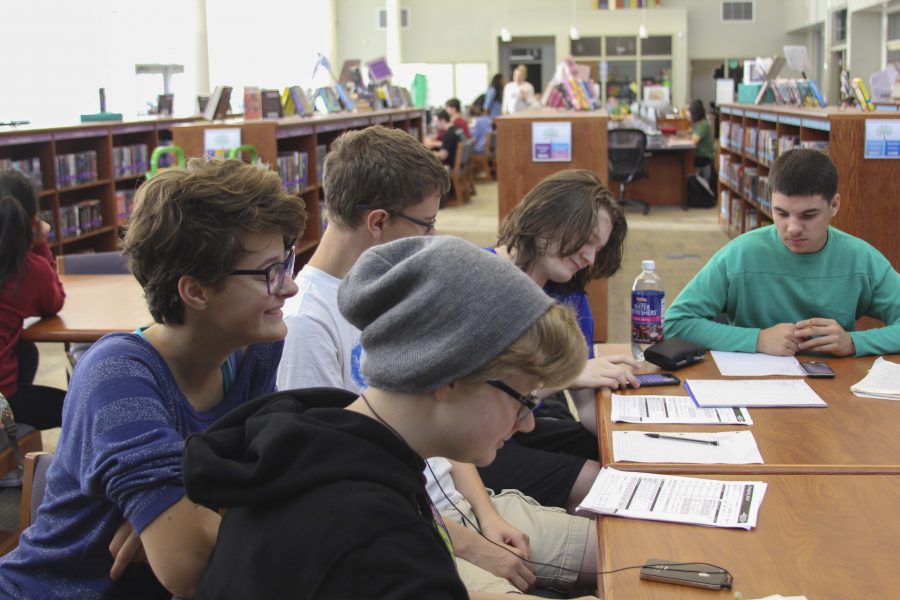Gaming students share their expieriences with playing during school hours
Every Thursday morning in the library, sophomores Kale DeYoung and Logan Hunter bring two tables together, drag over a few extra chairs and await the arrival of their peers.
DeYoung sits at the head of the table, Hunter at his left, as they watch more and more people flood into the room. Suddenly, their atmosphere transforms, and surrounding them is the world of Dungeons and Dragons — a world they collectively created and formed piece by piece every late arrival.
Dungeons and Dragons is one of the first fantasy tabletop role-playing games that has been popular among adolescents since The 70’s and, according to the Washington Post, has regained popularity recently due to the release of the latest edition of the game. DeYoung said it had always been relatively well known and is still being played at game shops around the country.
“I grew up hearing about people playing Dungeons, and then Kale invited me to play with him,” junior Rachel Humbert said. “So I did.”
Hunter said Dungeons and Dragons pioneered the tabletop gaming phenomenon, being apart of poplular culture and appearing in shows like the recent netflix hit “Stranger Things.” Because of this, Hunter said more and more students are interested in the game and appear in the library during late arrival.
“Everybody has their characters, and like with this morning, theoretically you could do whatever you want,” Hunter said. “But there is an actual system and you have to roll and see what happens.”
Players can make up their own characters in the game, and as Hunter said, do as they please within the rules the Dungeon Master (DM) has made. The DM typically sets up encounters between player characters and non-player characters, usually creating altercations in which participants have to fight off monsters.
“I suppose what really sets it apart is the fact that there’s a guideline to how things happen in the game — it’s not just a hot, chaotic mess of characters doing this and that,” Humbert said. “Though, it does have a really diverse range of how you can play it within those guidelines. One game you could be a dragon-slaying knight and the other game you could be a laser shooting cyborg, you know? I mean, there’s really no limit.”
DeYoung said he takes out time every Thursday morning to be the DM, and said it can take up quite a bit of his personal time. To him, it’s all worth it.
“I find it worthwhile for the social experience that people can get out of it and just playing through scenarios with risk or luck to guide the player,” DeYoung said. “I find it fun being able to create a world and see how people explore it and react to events I’ve placed around it.”
Dungeons and Dragons isn’t the only game played in the hallways. Senior Cameron Bates uses his free time in his seventh hour class to play a card game called Yu-Gi-Oh with his buddies.
“It’s not like Go Fish or anything like that,” said Bates. “It requires skill; it requires a lot of knowledge about the game, and it takes a while … it’s hard to pick up and it’s hard to master. It takes a lot of time. I play it for fun; I don’t really try that hard.”
Bates said the game usually gets a bad rap as it is naturally targeted toward children. However, he feels those who judge him are being hypocritical.
“Why do college students play Pokémon?” Bates said. “Why did half of the nation play Pokémon Go when it first came out, even though it’s marketed toward children? It’s just something fun to do, and, honestly, if I found fun with it, I don’t really care who it’s targeted for. ‘Why can’t I?’ is the real question…Nobody told me not to, so I did it.”
Bates said said he doesn’t want to obey the standards society has draped upon millennials.
“I feel like a big problem with a lot of people today is that our society has told us what is right and wrong — what is socially acceptable. As long as what you want to do is legal and fair, I think you can experiment and have fun. I feel like that’s what the game is supposed to be about: having fun.”
Games have taken on many shapes and forms, from cards in someone’s hands to pixels on someone’s screen. DeYoung said he appreciates the complex nature of the game, feeling the skills he has learned are helping him in his day-to-day life.
“It’s important that people are still playing because that means there is a general community that’s friendly and that have a lot of bright new ideas and a possible social outcome,” DeYoung said. “That’s the product of playing these types of games.”
Along with playing games comes the title of gamer, as well as the debate on what qualifies as a gamer. Bates said that anyone could technically be a gamer, but some students beg to differ.
“When you say ‘gaming,’ I usually tend to think about computer games,” Humbert said. “A lot of the people in our group are gamers — I guess because they play a lot of computer games and stuff. I think that we’re just a bunch of cool nerds doing a bunch of cool nerd stuff.”
